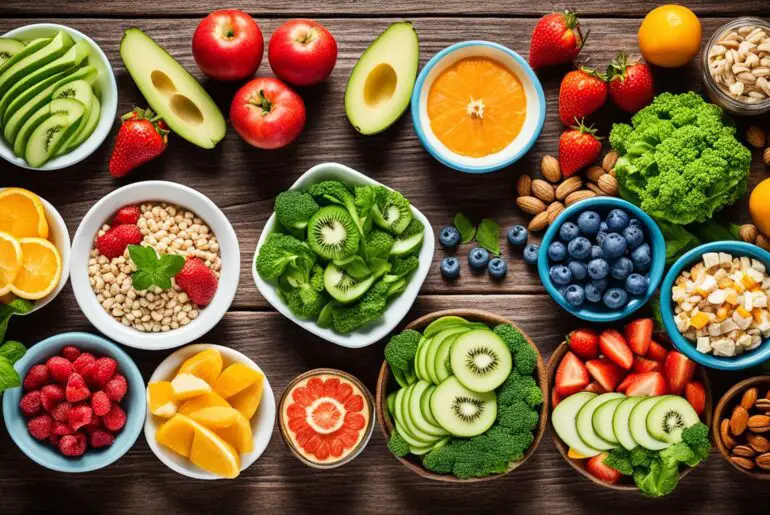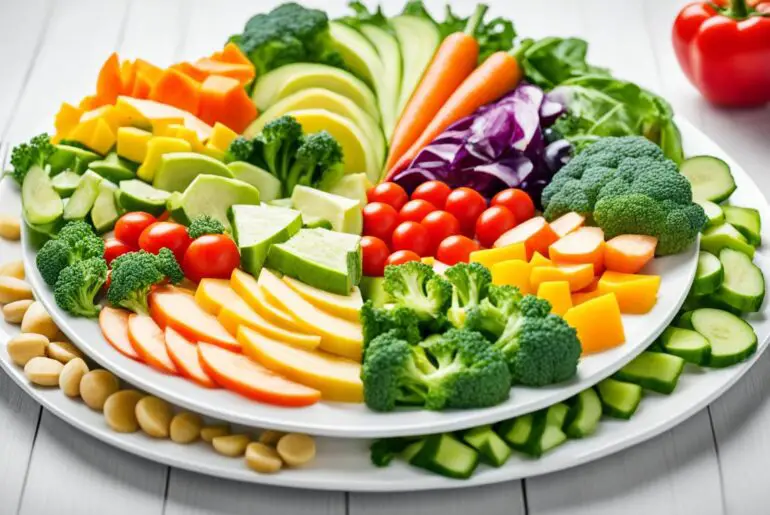Did you know that hunger is a common concern during Phase 2 of the HCG diet? Many individuals experience moments when cravings and hunger become more pronounced, making it challenging to stay on track with the diet plan. But fear not! There are effective strategies and tips that can be implemented to reduce hunger and ensure successful weight loss during this phase.
Key Takeaways:
- Stay hydrated by drinking enough water to help reduce hunger.
- Utilize coffee as an appetite suppressant.
- Incorporate green tea into your routine to decrease appetite.
- Space out your meals to regulate blood sugar levels.
- Ensure adequate protein intake to prevent excessive hunger between meals.
Tips to Reduce Hunger on the HCG Diet
Managing hunger is a crucial aspect of success during Phase 2 of the HCG diet. By implementing effective strategies, you can control hunger and stay on track with your weight loss goals. Here are some tips and techniques to help you reduce hunger:
- Stay Hydrated: Drinking an adequate amount of water throughout the day can help curb hunger. Aim for at least 8 cups of water daily to stay hydrated and promote satiety.
- Use Coffee as an Appetite Suppressant: Coffee can act as a natural appetite suppressant. Enjoy a cup of black coffee in the morning or between meals to help keep hunger at bay.
- Consume Green Tea: Green tea contains antioxidants and compounds that can decrease appetite. Incorporate a cup of green tea into your daily routine to help manage hunger.
- Space Out Meals: Instead of consuming three large meals, try spreading your food intake throughout the day by having smaller, more frequent meals. This can help regulate blood sugar levels and prevent excessive hunger.
- Ensure Adequate Protein Intake: Protein-rich foods, such as lean meats, eggs, and Greek yogurt, can help keep you feeling full and satisfied between meals. Aim to include a source of protein in each meal to reduce hunger.
- Incorporate “Free” Vegetables: Certain vegetables, like lettuce, cucumber, and celery, are considered “free” on the HCG diet because they are low in calories and can provide fiber and satiety. Use these vegetables to bulk up your meals and help reduce hunger.
Implementing these tips can help you manage hunger and cravings more effectively during Phase 2 of the HCG diet. Remember to consult with a healthcare professional before starting any new diet or weight loss program to ensure it is suitable for your individual needs.
Understanding Hunger Peaks on the HCG Diet

Hunger peaks are a common phenomenon during the first week of Phase 2 of the HCG diet. Typically occurring between days 4 to 6, this increase in hunger can be a challenge for individuals on the diet. However, it is important to understand the underlying factors contributing to these hunger peaks in order to successfully manage them and stay on track with the HCG diet.
The depletion of residual calories from the loading phase plays a significant role in hunger peaks during the initial days of Phase 2. As the body adjusts to the lower calorie intake, it is natural to experience increased hunger cravings. Additionally, the HCG hormone takes time to start working effectively, which further contributes to the temporary surge in hunger.
It is important to note that these hunger peaks are a transient phase and typically subside as the HCG hormone begins to tap into stored fat in the body and convert it into usable energy through ketosis. As the body adapts to this process, hunger levels start to decrease, allowing individuals to adjust to the dietary restrictions of Phase 2.
Managing hunger during the first week of the HCG diet requires patience and perseverance. It is crucial to stay committed to the diet plan, remembering that the initial phase can be the most challenging but also the most rewarding in terms of weight loss results. By staying focused and following the recommended guidelines, individuals can successfully navigate through these hunger peaks and achieve their weight loss goals.
The Importance of Proper Loading
Proper loading is a crucial step in the HCG diet journey as it sets the foundation for Phase 2. During the loading phase, the body prepares itself by replenishing calorie reserves and priming the metabolism to effectively burn fat. By consuming high-fat foods, you can ensure an adequate energy supply during the initial days of Phase 2, which helps reduce hunger and supports weight loss.
One of the key factors to consider during the loading phase is the quality of the fats you consume. Opt for healthy sources of fat, such as omega-3 fats found in foods like salmon and nuts. These fats not only provide the necessary calories but also offer numerous health benefits, including reducing inflammation and promoting heart health.
Here are some tips to optimize the loading phase for hunger management:
- Include a variety of high-fat foods in your diet, such as avocados, olive oil, and coconut milk.
- Focus on consuming whole, nutrient-dense foods rather than processed or fried options.
- Avoid excessive consumption of sugary or unhealthy fats, as they can lead to energy crashes and increased hunger.
- Consider incorporating intermittent fasting during the loading phase to improve insulin sensitivity and regulate appetite.
By prioritizing proper loading and making mindful choices about the fats you consume, you can optimize your body’s energy reserves and effectively manage hunger during Phase 2 of the HCG diet.
Tips for Hunger Management during the Loading Phase
Here are some additional tips to help manage hunger during the loading phase:
- Stay hydrated: Drinking an adequate amount of water can help curb hunger and keep you feeling satisfied.
- Space out meals: Eating smaller, more frequent meals throughout the day can help regulate blood sugar levels and prevent excessive hunger.
- Incorporate fiber-rich foods: Foods like fruits, vegetables, and whole grains can provide a sense of fullness and help manage hunger.
- Include protein in your meals: Protein not only helps build and repair tissues but also promotes satiety, reducing the chances of overeating.
- Get enough sleep: A lack of sleep can disrupt the body’s hunger-regulating hormones, leading to increased hunger and cravings.
Remember, the loading phase plays a vital role in your HCG diet success. By following these tips and prioritizing healthy fats, you can optimize your body’s energy reserves, reduce hunger, and set the stage for successful weight loss during Phase 2.
Preparing Meals in Advance

One of the most effective strategies for managing hunger on the HCG diet is to prepare your meals ahead of time. By setting aside time to plan and cook your meals in advance, you can avoid impulsive food choices when hunger strikes and stay on track with the diet plan.
Meal preparation not only helps you stay focused on your weight loss goals but also ensures that you have appropriate foods readily available. This is especially important during Phase 2 of the HCG diet when the calorie intake is restricted. By having pre-portioned meals and snacks on hand, you can easily stick to the recommended daily calorie limit and prevent deviations from the diet plan.
When preparing meals in advance for the HCG diet, it’s essential to include a variety of low-calorie, high-nutrient foods. Focus on lean protein sources like chicken, fish, and tofu, and incorporate plenty of fresh vegetables. Fiber-rich foods, such as leafy greens and cruciferous vegetables, can help increase satiety and manage hunger throughout the day.
Here is a sample meal-prep plan for a day on the HCG diet:
| Meal | Food | Portion Size |
|---|---|---|
| Breakfast | Vegetable omelette | 2 eggs, mixed vegetables |
| Snack | Apple slices with peanut butter | 1 small apple, 1 tablespoon of peanut butter |
| Lunch | Grilled chicken salad | 3 ounces of grilled chicken, mixed salad greens, cherry tomatoes, cucumbers |
| Snack | Greek yogurt with berries | 1 cup of Greek yogurt, mixed berries |
| Dinner | Baked white fish with steamed asparagus | 4 ounces of white fish, steamed asparagus |
| Snack | Celery sticks with hummus | Celery sticks, 2 tablespoons of hummus |
By following a meal-prep plan like this, you can ensure that your meals are nutritionally balanced, low in calories, and satisfying. Simply divide the prepared meals into individual containers and refrigerate or freeze them for later use.
Remember to drink plenty of water throughout the day to stay hydrated, and consider incorporating herbal teas or flavored water for extra variety. By being proactive and preparing meals in advance, you’ll be better equipped to manage hunger and achieve successful weight loss on the HCG diet.
Smart “Cheating” on the HCG Diet
While cheating is not encouraged on the HCG diet, there are certain smart strategies you can employ to alleviate hunger without compromising your weight loss goals. By incorporating permissible foods into your diet, you can satisfy your cravings and stay on track during Phase 2.
Permissible Foods for Hunger Relief
Here are some smart “cheating” options that can relieve hunger on the HCG diet:
| Food | Description |
|---|---|
| Green Vegetables | These nutrient-dense vegetables have negative calories, meaning they require more energy to digest than they provide. Including green vegetables like spinach, lettuce, and broccoli in your meals can help satiate hunger and provide essential nutrients. |
| Chicken Bouillon | A warm cup of low-calorie chicken bouillon can be a filling option when hunger strikes. The savory broth can help satisfy your taste buds without derailing your weight loss efforts. |
| High-Quality Beef Jerky | When craving a protein-rich snack, opt for high-quality beef jerky. It provides the necessary protein while keeping you satiated between meals. |
Remember, moderation is key when incorporating cheat foods into your diet. Be mindful of portion sizes and ensure that they fit within the recommended 500 calorie limit for Phase 2 of the HCG diet.
By choosing smart cheat foods and practicing portion control, you can effectively manage hunger without compromising your weight loss progress. Remember to consult with a healthcare professional before making any significant changes to your diet.
Brushing Your Teeth as a Hunger Management Technique

When hunger strikes during Phase 2 of the HCG diet, one simple technique that may help reduce cravings and distract from the sensation of hunger is brushing your teeth. Studies have shown that the minty taste and sensation of brushing can provide a temporary satisfaction, helping to overcome the urge to eat. While this method may not work for everyone, it is worth giving it a try as a complementary strategy to manage hunger and stay on track with your diet goals.
By brushing your teeth when hunger hits, you not only create a sensory diversion but also introduce a distinct taste in your mouth. This can help shift your focus away from food and interrupt the cravings that often accompany hunger pangs. Additionally, the act of brushing your teeth can provide a feeling of cleanliness and freshness, helping you feel satisfied and less inclined to eat.
Some individuals find that carrying a travel toothbrush and mini toothpaste with them can be useful for managing hunger on the go. Whenever hunger strikes, they can conveniently brush their teeth and experience the temporary relief it provides. Others may prefer to brush their teeth immediately after a meal to discourage snacking or overeating.
While brushing your teeth can be a helpful hunger management technique, it is important to remember that it is not a substitute for addressing essential nutritional needs. It is crucial to maintain a balanced and healthy diet, ensuring you consume adequate nutrients to support your overall well-being.
Remember, every person’s hunger cues and response to this technique may vary. Experiment with different strategies to find what works best for you, whether it’s brushing your teeth, engaging in a distracting activity, or practicing mindful eating techniques. The key is to listen to your body’s cues, find effective ways to manage hunger, and remain committed to your HCG diet journey.
Staying Motivated During Hunger Challenges

When it comes to the HCG diet, staying motivated during hunger challenges is crucial for success. The initial weeks of Phase 2 can present some of the most difficult moments, but they are also the most rewarding in terms of weight loss. To remain motivated, I recommend keeping your progress in mind and focusing on your ultimate goal of achieving weight loss success.
Remember, every step you take towards your goal is a step forward. Celebrate small victories along the way, such as reaching a milestone or fitting into a smaller size. These moments of accomplishment will boost your motivation and drive to continue with the diet.
Another important aspect is finding support. Join online communities or forums where you can connect with others who are going through the same experience. Sharing your challenges and victories can provide a sense of accountability and encouragement.
Setting realistic expectations is also key. Understand that hunger is a natural part of the process, but it is temporary. Remind yourself that these hunger challenges are a sign that your body is adjusting and burning stored fat. Focus on the long-term benefits and the improved well-being you will achieve.
Lastly, maintain a positive mindset. Instead of seeing hunger as a burden, reframe it as an opportunity to develop discipline and willpower. Embrace the journey and the lessons it teaches you about self-control and resilience.
By staying motivated during hunger challenges on the HCG diet, you will not only overcome the temporary discomfort but also achieve the desired weight loss results. Remember, discipline and determination are key to success on this journey.
Conclusion
Hunger management is an essential component of a successful HCG diet journey. By implementing effective strategies throughout Phase 2, individuals can maintain control over their hunger and achieve their weight loss goals. Staying hydrated by drinking adequate amounts of water helps to curb cravings and keep hunger at bay. Spacing out meals and incorporating cheat foods wisely can also contribute to hunger management.
Understanding the pattern of hunger peaks during the first week of Phase 2 is crucial. As the body adjusts to the HCG diet, hunger may become more pronounced. However, it’s important to remember that this is a temporary phase, and hunger will subside as the body starts utilizing stored fat for energy.
To ensure success on the HCG diet, it is recommended to prepare meals in advance. This helps to avoid impulsive food choices when hunger strikes. By having nutritious meals readily available, individuals can stay on track with their diet plan and resist the temptation to deviate.
Lastly, staying motivated is key to overcoming hunger challenges. Reminding oneself of the progress already made and focusing on the ultimate goal of achieving weight loss success can help individuals stay on course. Celebrating small victories, finding support, and setting realistic expectations contribute to a positive experience on the HCG diet.
Before embarking on any new diet or weight loss program, it’s always advisable to consult with a healthcare professional to ensure it aligns with individual health needs and goals.
FAQ
How can I reduce hunger while on Phase 2 of the HCG diet?
There are several strategies you can implement to reduce hunger during Phase 2 of the HCG diet. These include staying hydrated, using coffee and green tea as appetite suppressants, spacing out meals, and ensuring adequate protein intake. Incorporating “free” vegetables can also provide fiber and satiety.
When does hunger typically peak during Phase 2 of the HCG diet?
Hunger usually peaks between days 4 to 6 of Phase 2 of the HCG diet. During this period, it is common to experience increased hunger as the HCG starts to tap into stored fat and convert it into usable energy through ketosis.
How does the loading phase of the HCG diet help with hunger management?
The loading phase of the HCG diet is essential to prepare the body for Phase 2. Proper loading with high-fat foods increases calorie reserves and jump-starts the metabolization of fat. Consuming healthy sources of fat, such as omega-3 fats found in salmon and nuts, can ensure energy reserves during the initial days of Phase 2, reducing hunger and supporting weight loss.
How can I prepare meals ahead of time to manage hunger on the HCG diet?
Preparing meals in advance can help avoid temptation and maintain adherence to the HCG diet. Set aside time to plan and prepare meals in advance, reducing the likelihood of making impulsive food choices when hunger strikes. This strategy ensures that appropriate foods are readily available, preventing deviations from the diet plan.
Are there any permissible cheat foods that can alleviate hunger on the HCG diet?
While cheating is not encouraged on the HCG diet, there are certain foods that can be consumed in moderation to alleviate hunger without adversely affecting weight loss. These include green vegetables, chicken bouillon, and high-quality beef jerky. It is important to select cheat foods wisely and not exceed the recommended 500 calorie limit.
Can brushing my teeth help reduce hunger on the HCG diet?
Brushing your teeth when hunger strikes may help reduce cravings and distract from the sensation of hunger. The minty taste and sensation of brushing can provide temporary satisfaction, helping to overcome the urge to eat. While this technique may not work for everyone, it can be a simple and effective method to manage hunger during Phase 2 of the HCG diet.
How can I stay motivated during hunger challenges on the HCG diet?
It is crucial to stay motivated when facing hunger challenges on the HCG diet. Remind yourself of the progress you have already made and focus on the ultimate goal of achieving weight loss success. Finding support, setting realistic expectations, and celebrating small victories can help maintain motivation throughout the diet.
What is the importance of managing hunger on the HCG diet?
Hunger management is a key aspect of a successful HCG diet journey. By implementing strategies such as staying hydrated, spacing out meals, and incorporating cheat foods wisely, individuals can effectively manage hunger during Phase 2. Understanding the pattern of hunger peaks, preparing meals in advance, and staying motivated can further contribute to a positive experience on the HCG diet.




